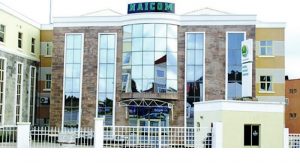Joy Agwunobi

Stakeholders in Nigeria's insurance sector have called for urgent intervention from the federal government, state governments, the National Insurance Commission (NAICOM), and industry leaders to address the critical shortage of actuaries in the country.
They warn that the lack of professionals in the field is stalling the growth of the insurance industry and limiting its ability to compete effectively.
Industry experts emphasise the need for increased funding, training programmes, and awareness to support actuarial education, which is crucial for the sector’s long-term sustainability. According to them, actuaries play a key role in assessing risks, pricing insurance products accurately, and ensuring the financial stability of insurance companies.
However, Nigeria’s insurance sector is facing a serious deficit of these professionals, leading to challenges in product pricing and market expansion.
Pius Apere, chairman and CEO of Achor Actuarial Services Limited, explained that pricing actuaries are responsible for analysing risk factors, market trends, and historical data to determine appropriate premium rates. He cautioned that without a sufficient number of actuaries, insurers in Nigeria are designing and pricing products without applying profit-testing techniques—a critical actuarial method used to assess profitability before launching an insurance product.
"This situation increases the risk of insurance companies offering unprofitable products, further weakening the industry," Apere stated. He added that the limited number of actuaries has also contributed to Nigeria’s low insurance penetration, as there are fewer well-structured insurance products tailored to meet the needs of a diverse population.
Furthermore, Apere pointed out that regulators, including NAICOM, require in-house actuarial expertise to evaluate and approve new insurance products effectively. However, poor awareness of the actuarial profession and its importance to economic development has led to inadequate funding for actuarial training programs.
He contrasted Nigeria’s situation with that of countries like the United Kingdom, where institutions such as the Government Actuary Department (GAD) provide actuarial solutions and financial risk assessments to support the public sector.
One of the biggest hurdles for aspiring actuaries in Nigeria is the lack of local professional bodies conducting actuarial certification exams. As a result, students are forced to pursue expensive foreign certifications, which are further complicated by high exchange rates and economic instability. Many insurance companies in Nigeria rely on foreign actuaries from countries such as South Africa and Kenya, adding financial strain to firms seeking actuarial expertise.
Gus Wiggle, principal consultant at Carefirst Consult, highlighted that the shortage is largely due to the limited number of educational institutions offering actuarial science programmes in Nigeria. Currently, only one university provides a full actuarial programme, leaving aspiring professionals with few options for local training.
“We have not invested enough in developing actuarial science education. Only one university in the country offers it as a dedicated course. Many Nigerians are unaware of the profession’s importance and the career opportunities it provides,” Wiggle noted.
He added that even the few actuaries trained in Nigeria are often lured by better career prospects abroad, leading to a brain drain that further depletes the local talent pool.
Wiggle suggested that the existing body of actuaries in Nigeria should form a professional organisation to regulate the profession, set standards, and provide certification. He also recommended partnerships with international actuarial organisations to facilitate knowledge-sharing and best practices.
Though progress is being made as the Institute and Faculty of Actuaries (IFoA) in the UK has granted accreditation to the University of Lagos (Unilag) for its postgraduate Master’s programme in Actuarial Science. This accreditation allows students to earn exemptions from six IFoA qualification requirements, providing a faster and more cost-effective pathway to becoming certified actuaries.
However, industry experts argue that more needs to be done to expand actuarial education at the undergraduate level to increase the number of professionals entering the field.
On his part, Ononiwu Chukwuma, an insurance management consultant urged the Federal Ministry of Education, Tertiary Education Trust Fund (TETFUND), NAICOM, the Nigeria Insurers Association, the Nigeria Actuarial Society, the Risk Managers Society of Nigeria, and the Professional Reinsurance Association of Nigeria to work together in reviving the actuarial profession.
“With Nigeria’s vast population, it is unacceptable that only two universities offer actuarial science programmes from the first-degree level to Ph.D. We need full support from NAICOM, the insurance industry, and the government to ensure adequate funding for actuarial training,” Chukwuma stated.
Experts stressed that sustained investment in actuarial training and professional development over the medium to long term is necessary to strengthen Nigeria’s insurance sector and enhance its global competitiveness. They emphasise that without a pipeline of well-trained actuaries, Nigeria's insurance industry will struggle to develop innovative products, attract investment, and achieve higher market penetration.
They urge NAICOM, state and federal governments, and key industry players to prioritize actuarial development, recognising that a strong actuarial workforce is essential to the stability and growth of Nigeria’s insurance market.